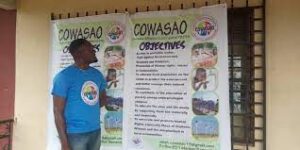Access to drinking water in Cameroon : (COWASAO) call on External Bodies to systematize the consideration of water quality in water supply projects and programmes.
 The world faces an invisible crisis of water quality that is eliminating one-third of potential economic growth in heavily polluted areas and threatening human and environmental well-being, according to a (COWASAO) experts report. Regarding Volcanoes, the communities continue to face major challenges in the water sector, particularly in terms of access to drinking water and water quality monitoring.
The world faces an invisible crisis of water quality that is eliminating one-third of potential economic growth in heavily polluted areas and threatening human and environmental well-being, according to a (COWASAO) experts report. Regarding Volcanoes, the communities continue to face major challenges in the water sector, particularly in terms of access to drinking water and water quality monitoring.
To contribute to the improvement of this worrying situation and support the Rural areas on Water in the Cameroon Water Vision 2035, (COWASAO) has committed itself to developing programmes to support stakeholders, such AfWA Capacity Building Programme (AfriCap), which aims to promote partnership in the field water sector.
To assess the progress of this programme, (COWASAO) , in partnership with the GROUP AQUAFOR of Bamenda and JOVEETE FOUNDATION, organized the 1st national Symposium on Water Quality in Bamenda, from 9 to 11 December 2019. Under the theme: “Investing in Water Quality for a Sustainable Life”, this symposium brought together about 57 experts, as well as development partners, donors and students from 12 African countries and 2 European countries. The objective was to share experiences, capitalize on the actions undertaken during the implementation of the programmes and define guidelines for better consideration of water quality by the various stakeholders in the sector and by the governing authorities.
Over two days, experts gathered in BUEA discussed the challenges, financing, capacity building, policies and regulations of the water sector in Volcanoes areas. At the end of their work, they formulated recommendations contained in the following Declaration.
DECLARATION OF CAMEROON WATER SUPPLY.
We, participants of the international symposium on water quality, meet in Yaounde , Bamenda and Buea, on December 5-10, 2020, 1 year after the adoption of the Sustainable Development Goals (SDGs), taking into account targets 1 and 3 of objective 6 related to water quality,
Declare the following:
Considering that universal access to water and adequate sanitation constitute human rights recognized in the universal charter of human rights to which most of African countries have subscribed; Considering that the deterioration of the quality of water resources affects the ecosystem, health of consumers and increase drinking water production costs;
Considering that one of the strategic tools used by most of African countries to ensure water quality is the Water Safety Plan (WSP),
Realizing that water security is a key factor in the socio-political and economic development of CAMEROON,
Convinced that without adequate policies and regulations, followed with enough material, financial and human resources in quantity and quality, the implementation of the control and monitoring of water quality cannot be effective
Edified by the fact that the development of North-South and South-South Of Cameroon partnerships through different networking channels constitutes one of the important levers for strengthening the capacities of local actors through benchmarking and peer-to-peer,
Agree on the following recommendations:
In terms of policies and regulation:
1. To develop and implement binding policies for water users with a view to ensuring water safety;
2. To develop a synergy between existing consultation frameworks and popularize their results;
3. To systematize the integration of water quality aspect in water supply projects and programs;
4. To develop environmental education for school children and households;
5. To take incentives for private investors on water quality;
6. To promote the development of African water quality guidelines.
In terms of capacity building:
1. To encourage partnerships between water companies (WOP);
2. To align training curricula with the needs of water quality control laboratories;
3. To mutualize the resources of existing training centers and universities in the countries;
4. To strengthen the partnership between research institutes and water companies on water quality issues;
5. To raise awareness among stakeholders (industrial, mining, etc.) on anti-pollution measures for less polluted raw water.
